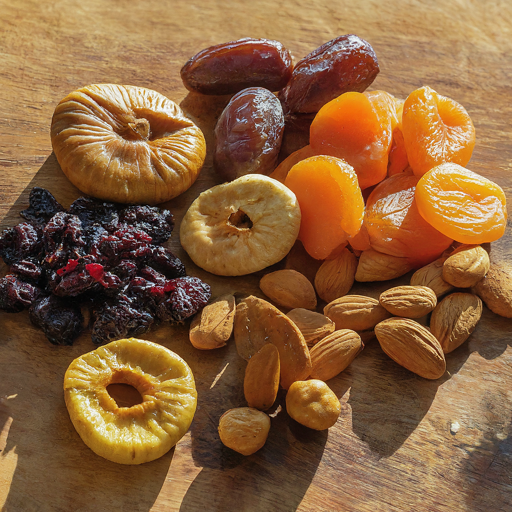Dried fruit has become a popular snack for health-conscious individuals and busy people alike. It’s a convenient, portable, and long-lasting way to enjoy the flavors and benefits of fruit without worrying about spoilage. But what exactly is dried fruit, and why should you consider adding it to your diet? Let’s explore!
What is Dried Fruit?
Dried fruit is simply fresh fruit that has had most of its water content removed through drying processes. The result is a concentrated version of the fruit with an extended shelf life. Common methods of drying fruit include sun drying, using dehydrators, or freeze-drying. Popular dried fruits include:
- Raisins (dried grapes)
- Dried apricots
- Prunes (dried plums)
- Dried mangoes
- Dried apples
- Dried berries like cranberries and blueberries
Nutritional Benefits of Dried Fruit
One of the reasons people love dried fruit is because it retains much of the nutritional value of fresh fruit, while offering some additional benefits:
- Rich in Nutrients: Dried fruit is packed with essential vitamins and minerals, such as fiber, iron, potassium, and antioxidants. For instance, raisins are known for their high iron content, while dried apricots are an excellent source of Vitamin A.
- High in Fiber: Fiber is crucial for a healthy digestive system, and dried fruits like prunes and figs are especially known for their fiber content. Including them in your diet can help with digestion and promote regular bowel movements.
- Antioxidants: Many dried fruits, such as raisins and cranberries, contain powerful antioxidants like polyphenols. These compounds help combat oxidative stress, which can reduce inflammation and protect your body from diseases.
- Natural Sweetness: Dried fruits are naturally sweet because the drying process concentrates the sugars found in fruit. This makes them a healthy alternative to sugary snacks and desserts.
How to Enjoy Dried Fruit
The beauty of dried fruit is its versatility. Here are some simple and creative ways to incorporate it into your diet:
- Snack on the Go: Dried fruit is a perfect, non-messy snack that you can take anywhere — work, school, the gym, or when traveling.
- Mix with Nuts and Seeds: Create a custom trail mix by combining your favorite dried fruits with nuts, seeds, and even a bit of dark chocolate for a satisfying and nutritious snack.
- Add to Breakfast: Sprinkle dried fruit like raisins, cranberries, or dates onto your cereal, oatmeal, or yogurt for an extra burst of flavor and nutrition.
- Incorporate into Baking: Dried fruit is a fantastic addition to baked goods like muffins, breads, or cookies. Try adding dried apricots or figs to your next batch of cookies!
- Toss in Salads: Dried fruits like cranberries or apricots add a sweet contrast to savory salads, especially when paired with nuts and cheese.
Things to Watch Out For
While dried fruit is a healthy option, there are a few things to keep in mind to avoid overindulging:
- Portion Control: Dried fruit is more calorie-dense than fresh fruit because it’s more concentrated. A small handful can contain as much sugar and calories as a full serving of fresh fruit, so it’s best to eat in moderation.
- Added Sugars: Some dried fruits, especially those like dried cranberries or mangoes, often come with added sugars to enhance flavor. When possible, choose dried fruit labeled as “unsweetened” or “no added sugar” to avoid consuming unnecessary extra sugar.
- Sulfites: Some dried fruits are treated with sulfites to preserve their color and extend shelf life. If you are sensitive to sulfites or prefer more natural foods, look for dried fruits that are labeled “sulfite-free.”
The Environmental and Economic Impact
Dried fruit is not only good for you, but it’s also beneficial for the environment and the economy:
- Less Food Waste: Since dried fruit has a longer shelf life than fresh fruit, it helps reduce food waste. You can stock up on dried fruit without worrying about it going bad quickly.
- Supports Local Farmers: Many dried fruits are produced by local farms, supporting small-scale agriculture. Buying dried fruit from farmers’ markets or local brands can be a way to support your community.
Conclusion
Dried fruit is a nutrient-rich, delicious, and convenient snack that can easily fit into a busy lifestyle. Whether you enjoy it on its own, in a trail mix, or as part of a meal, it’s a great way to enjoy the benefits of fruit with a longer shelf life. Just remember to watch your portion sizes and choose natural, unsweetened varieties when possible to make the most of its health benefits.
So the next time you’re looking for a quick snack, reach for a handful of dried fruit!





Comments